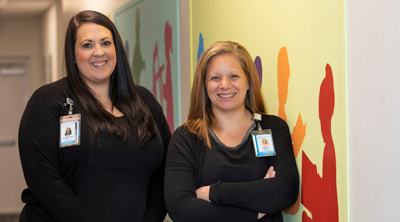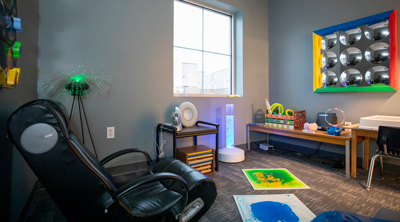A center of hope

Jessica Maddern (left) and Jennifer Naughton (right), clinical coordinators at Bridgeport Hospital’s REACH Program for outpatient mental health, stand by a mural that depicts the journey from childhood through adulthood, which represents the range of people served by the program.
Just down the hill from Bridgeport Hospital, the Barnum Avenue Business Center blends in among the homes and small shops that line the street. But passersby may not realize that within this seemingly ordinary building lives an extraordinary community resource – Bridgeport Hospital’s REACH Program, a center of hope for people with mental and behavioral health issues who are working to balance their lives with the realities of their illness.
REACH is an intensive, outpatient psychiatric program for children, adolescents and adults designed to help them manage their illness through mental health assessments, group therapy, medication management, case management and after-care planning. REACH is not an acronym, but the program stands for supporting and empowering people to build a foundation where they can begin to reach their full potential.
“Fortunately, with the right treatment, people with mental health issues can control or overcome their illnesses and flourish in society,” said Margarita Munoz, MD, medical director, REACH.
Mental illness affects millions of people in the United States. According to the Centers for Disease Control and Prevention, more than half of all Americans are diagnosed with a mental health issue at some point in their lifetime. There are many types of mental health conditions that affect people’s thoughts, feelings, moods and behaviors. Some of the symptoms that may bring people to REACH for help are depression, mood swings, social isolation, suicidal thoughts, thoughts of harming themselves or others, anxiety and panic, aggressive behavior, loss of motivation or energy, avoiding school or work, and substance abuse.
“Without proper treatment, these conditions can interfere with people’s education, work and relationships,” Dr. Munoz said. “Access to mental health treatment that is appropriate for people’s individual circumstances can enhance their mental, behavioral and emotional stability and change their lives. REACH provides the community with this access, which makes it such an important resource.”
REACH is the only program of its kind in the greater Bridgeport area. Referrals for mental health assessments come in to the program from schools, clinics, physicians, the Department of Children and Families (DCF), emergency departments, inpatient facilities and other healthcare providers. Family and self-referrals are also encouraged.
“We never turn people away,” said Jessica Maddern, clinical coordinator, REACH. “We evaluate them and if they aren’t candidates for our program specifically, we work with them and make a plan for their health. We connect them with psychiatrists, therapists, social workers, support groups and other providers and programs that can help them get to their next step,” she explained.
It is this availability that helps people access the resources they need and puts hope and health within an arm’s length.
“If someone makes the effort to come through our door, it is our responsibility to meet them there,” said Jennifer Naughton, clinical coordinator, REACH. “Just having a plan means they have hope, and they deserve that.”
For the more than 1,000 people admitted to the REACH Program each year, the staff helps them manage their conditions so their lives aren’t dictated by their illness.
“We focus on helping people understand their illness – the symptoms, triggers, medications and treatments,” said Dr. Munoz. “Education empowers our patients to manage their condition, which makes an important difference in their long-term success. Without this level of understanding, mental health can be a revolving door.”
REACH also provides a safe space for people to open up about their challenges and connect with each other through youth and adult group-based treatment programs that foster social skills and awareness – crucial components of recovery and well-being.
“Here, in a setting that’s judgment-free, everyone is connected by a common goal – getting better,” Dr. Munoz said. “There is camaraderie in recovery. It helps people with belonging, healing their wounds, and feeling seen and understood.”
“It’s almost like a rite of passage,” Naughton explained. “People join the groups at different times, not knowing anyone when they begin. They get to know each other over six to eight weeks and watch as their peers who started before them graduate. Interacting in the groups gives people the skills, confidence and hope to make it to their graduation and move on to the next stage of their recovery.”
When people leave REACH, their care doesn’t stop. Life after REACH includes therapy, medication management, specialist care and other services patients may need that the REACH team organizes for them at the beginning of the program so that it’s in place by the time they graduate. This ensures they maintain the progress they made while in treatment without any gaps in care.
For all of the assistance REACH offers, the staff acknowledges that it is the people who help themselves manage their condition that deserve the bulk of the credit.
“It takes bravery for people with mental illness to combat the stigma and invest in their care,” said Dr. Munoz. “It’s our job to make sure they have the means to get better.”
Maddern concurred. “We have a dedication to wellness here. Everyone deserves the right to live a healthy life.”
For more information on REACH or to make a referral, call 203-384-3377, 8:30 am - 5 pm, and ask for a clinical coordinator.
Community Support for REACH

Equipment and supplies – such as the massage chair, mirrors, liquid floor tiles and bubble tube shown above – promote stress relief, improve mood and communication and encourage positive behavior for behavioral health patients. Funding for this equipment is just one example of how community support helps REACH help people.
Decreasing reimbursement for outpatient behavioral health has created a shortage of funding and resources for programs like REACH across the country. Because of this shortfall, community support has been vital to ensuring people who need help have access to these mental health services.
“Bridgeport Hospital and the community’s support for REACH has been instrumental in providing the tools that make the program the success that it is,” said Jessica Maddern, clinical coordinator, REACH. “This support reinforces our mission to provide a safe, enriching and healthy environment where our patients can heal and grow.”
Such support has helped to purchase necessary equipment and supplies for the program and create a warm environment that underpins positivity. Funds have also recently been dedicated to adding a new child and adult psychologist to the program.
“Look no further than the news headlines of the day to understand the far-reaching and often tragic impact of behavioral health issues on people in our own communities and across the nation,” said Charles Morgan, MD, chair of Psychiatry and Behavioral Health at Bridgeport Hospital. “As a society, we need to act proactively by providing the needed individual and family support to help people manage their conditions and lead productive lives.”
The Bridgeport Hospital Foundation, the hospital’s official fundraising arm, works with community donors to support a broad range of hospital programs and services, including mental health. To make a donation to the REACH Program, visit
foundation.bridgeporthospital.org.



